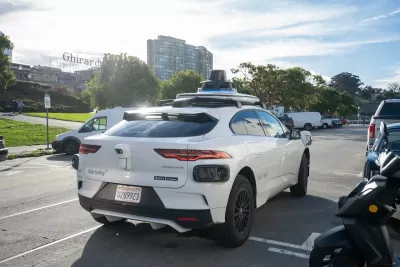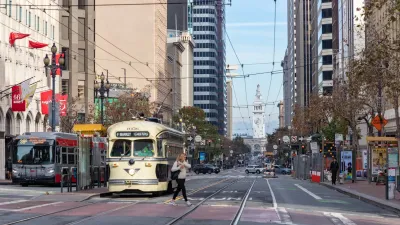Multiple sites slated for housing development are now being turned into charging and storage lots for autonomous vehicles, making housing an unintended victim of the robotaxi revolution.

The growth of autonomous taxis could be contributing to San Francisco’s housing crisis, according to an article by J.K. Dineen in the San Francisco Chronicle.
“From Jackson Square to the Mission to SoMa, some San Francisco property owners are trading in risky, but potentially lucrative, housing developments for the relatively easy money offered by the autonomous vehicle industry’s growing need for fleet charging lots.” Now, hundreds of proposed housing units are being nixed in favor of robotaxi charging lots.
Dineen points out that charging stations are themselves expensive and require a Planning Commission hearing. “For developers looking to make long-term income from AV fleet charging, that level of investment could be worthwhile. But it’s probably not attractive as a temporary use while a builder is waiting for interest rates and construction costs to come down to the level where housing works.” However, in a city where housing development can already be prohibitively expensive, AV charging lots, operated by multi-billion-dollar companies with deep pockets, could become a major competitor for urban real estate.
FULL STORY: Could robotaxis be yet another reason for S.F.’s lack of new housing?

Planetizen Federal Action Tracker
A weekly monitor of how Trump’s orders and actions are impacting planners and planning in America.

Congressman Proposes Bill to Rename DC Metro “Trump Train”
The Make Autorail Great Again Act would withhold federal funding to the system until the Washington Metropolitan Area Transit Authority (WMATA), rebrands as the Washington Metropolitan Authority for Greater Access (WMAGA).

The Simple Legislative Tool Transforming Vacant Downtowns
In California, Michigan and Georgia, an easy win is bringing dollars — and delight — back to city centers.

The States Losing Rural Delivery Rooms at an Alarming Pace
In some states, as few as 9% of rural hospitals still deliver babies. As a result, rising pre-term births, no adequate pre-term care and harrowing close calls are a growing reality.

The Small South Asian Republic Going all in on EVs
Thanks to one simple policy change less than five years ago, 65% of new cars in this Himalayan country are now electric.

DC Backpedals on Bike Lane Protection, Swaps Barriers for Paint
Citing aesthetic concerns, the city is removing the concrete barriers and flexposts that once separated Arizona Avenue cyclists from motor vehicles.
Urban Design for Planners 1: Software Tools
This six-course series explores essential urban design concepts using open source software and equips planners with the tools they need to participate fully in the urban design process.
Planning for Universal Design
Learn the tools for implementing Universal Design in planning regulations.
Smith Gee Studio
City of Charlotte
City of Camden Redevelopment Agency
City of Astoria
Transportation Research & Education Center (TREC) at Portland State University
US High Speed Rail Association
City of Camden Redevelopment Agency
Municipality of Princeton (NJ)





























